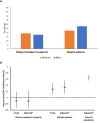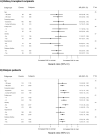Sex differences in COVID-19 mortality risk in patients on kidney function replacement therapy
- PMID: 36289317
- PMCID: PMC9606116
- DOI: 10.1038/s41598-022-22657-4
Sex differences in COVID-19 mortality risk in patients on kidney function replacement therapy
Abstract
In the general population with COVID-19, the male sex is an established risk factor for mortality, in part due to a more robust immune response to COVID-19 in women. Because patients on kidney function replacement therapy (KFRT) have an impaired immune response, especially kidney transplant recipients due to their use of immunosuppressants, we examined whether the male sex is still a risk factor for mortality among patients on KFRT with COVID-19. From the European Renal Association COVID-19 Database (ERACODA), we examined patients on KFRT with COVID-19 who presented between February 1st, 2020, and April 30th, 2021. 1204 kidney transplant recipients (male 62.0%, mean age 56.4 years) and 3206 dialysis patients (male 61.8%, mean age 67.7 years) were examined. Three-month mortality in kidney transplant recipients was 16.9% in males and 18.6% in females (p = 0.31) and in dialysis patients 27.1% in males and 21.9% in females (p = 0.001). The adjusted HR for the risk of 3-month mortality in males (vs females) was 0.89 (95% CI 65, 1.23, p = 0.49) in kidney transplant recipients and 1.33 (95% CI 1.13, 1.56, p = 0.001) in dialysis patients (pinteraction = 0.02). In a fully adjusted model, the aHR for the risk of 3-month mortality in kidney transplant recipients (vs. dialysis patients) was 1.39 (95% CI 1.02, 1.89, p = 0.04) in males and 2.04 (95% CI 1.40, 2.97, p < 0.001) in females (pinteraction = 0.02). In patients on KFRT with COVID-19, the male sex is not a risk factor for mortality among kidney transplant recipients but remains a risk factor among dialysis patients. The use of immunosuppressants in kidney transplant recipients, among other factors, may have narrowed the difference in the immune response to COVID-19 between men and women, and therefore reduced the sex difference in COVID-19 mortality risk.
© 2022. The Author(s).
Conflict of interest statement
The authors declare no competing interests.
Figures


References
-
- Takahashi T, Ellingson MK, Wong P, Israelow B, Lucas C, Klein J, Silva J, Mao T, Oh JE, Tokuyama M, Lu P, Venkataraman A, Park A, Liu F, Meir A, Sun J, Wang EY, Casanovas-Massana A, Wyllie AL, Vogels CBF, Earnest R, Lapidus S, Ott IM, Moore AJ, Yale IMPACT Research Team. Shaw A, Fournier JB, Odio CD, Farhadian S, Dela Cruz C, Grubaugh ND, Schulz WL, Ring AM, Ko AI, Omer SB, Iwasaki A. Sex differences in immune responses that underlie COVID-19 disease outcomes. Nature. 2020;588(7837):315–320. doi: 10.1038/s41586-020-2700-3. - DOI - PMC - PubMed
-
- Cravedi P, Mothi SS, Azzi Y, Haverly M, Farouk SS, Pérez-Sáez MJ, Redondo-Pachón MD, Murphy B, Florman S, Cyrino LG, Grafals M, Venkataraman S, Cheng XS, Wang AX, Zaza G, Ranghino A, Furian L, Manrique J, Maggiore U, Gandolfini I, Agrawal N, Patel H, Akalin E, Riella LV. COVID-19 and kidney transplantation: Results from the TANGO International Transplant Consortium. Am. J. Transplant. 2020;20(11):3140–3148. doi: 10.1111/ajt.16185. - DOI - PMC - PubMed
-
- Kremer D, Pieters TT, Verhaar MC, Berger SP, Bakker SJL, van Zuilen AD, Joles JA, Vernooij RWM, van Balkom BWM. A systematic review and meta-analysis of COVID-19 in kidney transplant recipients: Lessons to be learned. Am. J. Transplant. 2021;21(12):3936–3945. doi: 10.1111/ajt.16742. - DOI - PMC - PubMed
-
- Vinson AJ, Dai R, Agarwal G, Anzalone AJ, Lee SB, French E, Olex AL, Madhira V, Mannon RB, National COVID Cohort Collaborative (N3C) Consortium Sex and organ-specific risk of major adverse renal or cardiac events in solid organ transplant recipients with COVID-19. Am. J. Transplant. 2022;22(1):245–259. doi: 10.1111/ajt.16865. - DOI - PMC - PubMed

